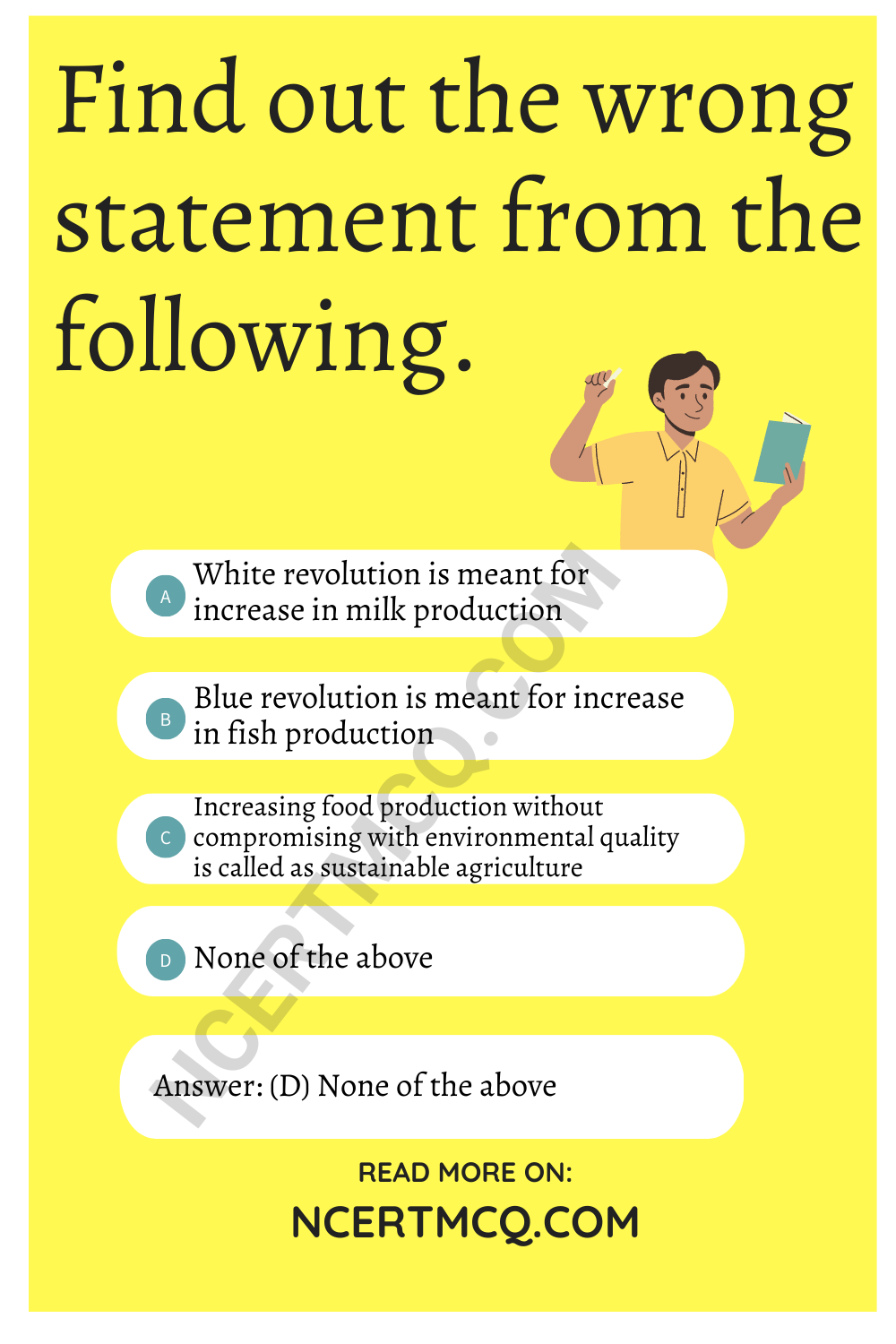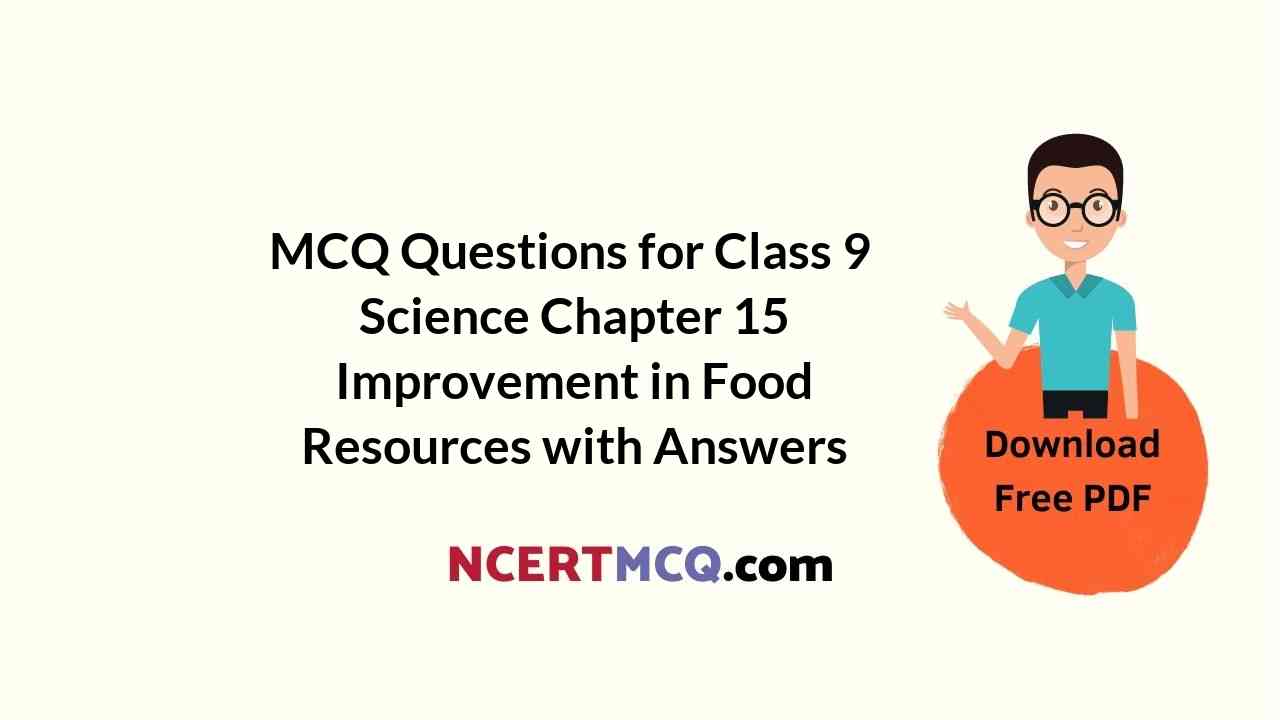Check the below Online Education NCERT MCQ Questions for Class 9 Science Chapter 15 Improvement in Food Resources with Answers Pdf free download. MCQ Questions for Class 9 Science with Answers were prepared based on the latest exam pattern. We have Provided Improvement in Food Resources Class 9 Science MCQs Questions with Answers to help students understand the concept very well. https://ncertmcq.com/mcq-questions-for-class-9-science-with-answers/
You can refer to NCERT Solutions for Class 9 Science Chapter 15 Improvement in Food Resources to revise the concepts in the syllabus effectively and improve your chances of securing high marks in your board exams.
Class 9 Science Biology Chapter 15 MCQ With Answers
Biology Class 9 Chapter 15 MCQs On Improvement in Food Resources
Improvement In Food Resources Class 9 MCQ Question 1.
Which one is an oil yielding plant among the following?
(a) Lentil
(b) Sunflower
(c) Cauliflower
(d) Hibiscus
Answer
Answer: (b) Sunflower
Improvement In Food Resources MCQ Question 2.
Which one is not a source of carbohydrate?
(a) Rice
(b) Millets
(c) Sorghum
(d) Gram
Answer
Answer: (d) Gram
Class 9 Science Chapter 15 MCQ Question 3.
Find out the wrong statement from the following.
(a) White revolution is meant for increase in milk production
(b) Blue revolution is meant for increase in fish production
(c) Increasing food production without compromising with environmental quality is called as sustainable agriculture
(d) None of the above
Answer
Answer: (d) None of the above

MCQ Of Improvement In Food Resources Question 4.
To solve the food problem of the country, which among the following is necessary?
(a) Increased production and storage of food grains
(b) Easy access of people to the food grain
(c) People should have money to purchase the grains
(d) All of the above
Answer
Answer: (d) All of the above
Class 9 Improvement In Food Resources MCQ Question 5.
Find out the correct sentence.
(i) Hybridisation means crossing between genetically dissimilar plants
(ii) Cross between two varieties is called as inter specific hybridisation
(iii) Introducing genes of desired character into a plant gives genetically modified crop
(iv) Cross between plants of two species is called as inter varietal hybridisation
(a) (i) and (iii)
(b) (ii) and (iv)
(c) (ii) and (iii)
(d) (iii) and (iv)
Answer
Answer: (a) (i) and (iii)
MCQ On Improvement In Food Resources Class 9 Question 6.
Weeds affect the crop plants by
(a) killing of plants in field before they grow
(b) dominating the plants to grow
(c) competing for various resources of crops (plants) causing low availability of nutrients
(d) all of the above.
Answer
Answer: (c) competing for various resources of crops (plants) causing low availability of nutrients
MCQ Questions Of Ch Improvement In Food Resources Class 9 With Answers Question 7.
Which one of the following species of honeybee is an Italian species?
(a) Apis dorsata
(b) Apis florae
(c) Apis cerana indica
(d) Apis mellifera
Answer
Answer: (d) Apis mellifera
Improvement In Food Resources Class 9 MCQ With Answers Question 8.
Find out the correct sentence about manure.
(i) Manure contains large quantities of organic matter and small quantities of nutrients.
(ii) It increases the water holding capacity of sandy soil.
(iii) It helps in draining out of excess of water from clayey soil.
(iv) Its excessive use pollutes environment because it is made of animal excretory waste.
(a) (i) and (iii)
(b) (i) and (ii)
(c) (ii) and (iii)
(d) (iii) and (iv)
Answer
Answer: (b) (i) and (ii)
Class 9 Science Ch 15 MCQ Question 9.
Cattle husbandry is done for the following purposes:
(i) Milk production
(ii) Agricultural work
(iii) Meat production
(iv) Egg production
(a) (i), (ii) and (iii)
(b) (ii), (iii) and (iv)
(c) (iii) and (iv)
(d) (i) and (iv)
Answer
Answer: (a) (i), (ii) and (iii)
MCQ On Improvement In Food Resources Question 10.
Which of the following are Indian cattle?
(i) Bos indicus
(ii) Bos domestica
(iii) Bos bubalis
(iv) Bos vulgaris
(a) (i) and (iii)
(b) (i) and (ii)
(c) (ii) and (iii)
(d) (iii) and (iv)
Answer
Answer: (a) (i) and (iii)
Class 9 Chapter 15 Science MCQ Question 11.
Which of the following are exotic breeds?
(i) Brawn
(ii) Jersey
(iii) Brown Swiss
(iv) Jersey Swiss
(a) (i) and (iii)
(b) (ii) and (iii)
(c) (i) and (iv)
(d) (ii) and (iv)
Answer
Answer: (b) (ii) and (iii)
MCQs On Improvement In Food Resources Question 12.
Poultry farming is undertaken to raise following
(i) Egg production
(ii) Feather production
(iii) Chicken meat
(iv) Milk production
(a) (i) and (iii)
(b) (i) and (ii)
(c) (ii) and (iii)
(d) (iii) and (iv)
Answer
Answer: (a) (i) and (iii)
Improvement In Food Resources Class 9 MCQ Online Test Question 13.
Poultry fowl are susceptible to the following pathogens
(a) Viruses
(b) Bacteria
(c) Fungi
(d) All of the above
Answer
Answer: (d) All of the above
Food Production Class 9 MCQ Question 14.
Which one of the following fishes is a surface feeder?
(a) Rohus
(b) Mrigals
(c) Common carps
(d) Catlas
Answer
Answer: (d) Catlas
MCQ Of Chapter 15 Science Class 9 Question 15.
Animal husbandry is the scientific management of
(i) animal breeding
(ii) culture of animals
(iii) animal livestock
(iv) rearing of animals
(a) (i), (ii) and (iii)
(b) (ii), (iii) and (iv)
(c) (i), (ii) and (iv)
(d) (i), (iii) and (iv)
Answer
Answer: (d) (i), (iii) and (iv)
Question 16.
Which one of the following nutrients is not available in fertilisers?
(a) Nitrogen
(b) Phosphorus
(c) Iron
(d) Potassium
Answer
Answer: (c) Iron
Question 17.
Preventive and control measures adopted for the storage of grains include
(a) strict cleaning
(b) proper disjoining
(c) fumigation
(d) all of the above
Answer
Answer: (d) all of the above

Fill in the blanks
1. There are ……………. nutrients essential for growth of crops.
Answer
Answer: 16
2. Manure and …………… are the main sources of nutrient supply to the crop plants.
Answer
Answer: fertilisers
3. Organic farming is a farming system with minimal or no use of …………..
Answer
Answer: chemicals
4. The growing of different crops on a piece of land in pre-planned succession is called ……………
Answer
Answer: crop rotation
5. Poultry farming is done to raise domestic …………….
Answer
Answer: fowl
6. Cross breeding is done between ……………. and …………… breeds for variety improvement.
Answer
Answer: indigenous, exotic
7. Marine fish capture is done by ……………. guided by echo-sounders and satellites.
Answer
Answer: marine fishery
8. Bee-keeping or ……………. is done to get honey and wax.
Answer
Answer: rearing the honeybee
9. The value or …………… of honey depends upon the pasturage available.
Answer
Answer: quality
10. The …………….. bees have high honey collection capacity and sting somewhat less.
Answer
Answer: Apis mellifera
11. Fishing can be done both by ………….. and …………… of fish in marine and freshwater ecosystems.
Answer
Answer: capture, culture
12. Animal feed includes ……………. which is largely fibre, and …………….. which are low in fibre and contain relatively high levels of proteins and other nutrients.
Answer
Answer: roughage, concentrates
13. The ……………. stop the rainwater from flowing away and also reduce soil erosion.
Answer
Answer: small check-dams
14. In …………… soils, the large quantities of organic matter help in drainage and in avoiding water logging.
Answer
Answer: clayey
15. Vermicompost is prepared by using …………….. to hasten the process of decomposition of plant and animal refuse.
Answer
Answer: earthworms
Match the following columns
| Column I | Column II |
| (a) Increase in fish production | (i) Oil-seed crop |
| (b) Wheat | (ii) Roughage |
| (c) Cross between two different species of the same genus | (iii) Fodder crop |
| (d) Exotic breed | (iv) Bio-pesticide |
| (e) Turmeric | (v) Blue revolution |
| (f) Berseem | (vi) Jersey |
| (g) Largely fibre component of feed | (vii) Inter-specific |
| (h) Sesame | (viii) Energy-yielding |
| (i) Longer lactation period | (ix) Leghorn |
Answer
Answer:
| Column I | Column II |
| (a) Increase in fish production | (v) Blue revolution |
| (b) Wheat | (viii) Energy-yielding |
| (c) Cross between two different species of the same genus | (vii) Inter-specific |
| (d) Exotic breed | (ix) Leghorn |
| (e) Turmeric | (iv) Bio-pesticide |
| (f) Berseem | (iii) Fodder crop |
| (g) Largely fibre component of feed | (ii) Roughage |
| (h) Sesame | (i) Oil-seed crop |
| (i) Longer lactation period | (vi) Jersey |
We hope the given NCERT MCQ Questions for Class 9 Science Chapter 15 Improvement in Food Resources with Answers Pdf free download will help you. If you have any queries regarding Improvement in Food Resources CBSE Class 9 Science MCQs Multiple Choice Questions with Answers, drop a comment below and we will get back to you soon.
Class 9 Science Biology MCQ:
